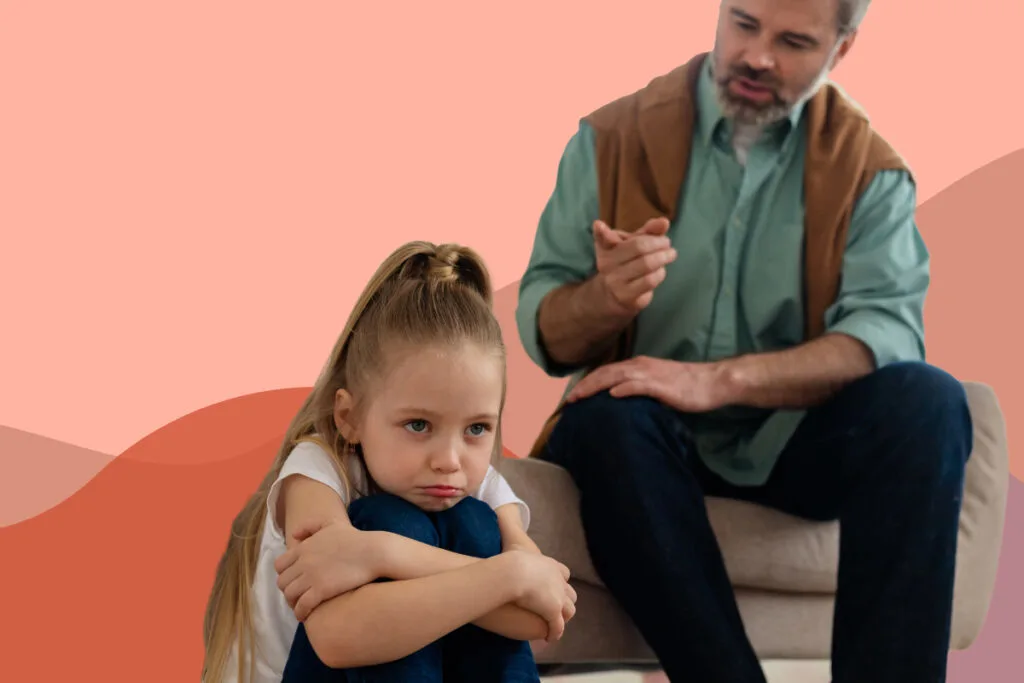TABLE OF CONTENTS
What is Parental Rejection
Parental rejection is the absence or significant withdrawal of warmth, love, and affection by parents using physically or psychologically hurtful behaviors or emotions. It can be experienced by four types of expressions or parenting styles:
- Cold and unaffectionate
- Hostile and aggressive
- Indifferent and neglecting
- Undifferentiated rejecting – when a child believes their parents do not really care about or love them, regardless of whether they show clear signs of neglect, unaffection, or aggression.
Having the perception of being rejected by parents is a painful experience. It can significantly impact a child’s psychological and social development.
According to the parental acceptance-rejection theory (PARTheory), the important thing is whether the child perceives this as true, not whether a third party observes this to be true1.

Examples of Parental Rejection
Parent rejection can take the form of physical rejection or emotional rejection.
- A lack of parental warmth and caregiving
- Indifference or neglect of the child’s physical or emotional needs
- Scolding, belittling, cursing, shaming, sarcastic, mocking, or disparaging
- Hitting, beating, or throwing things
- Making the child feel unloved, inadequate, or unwanted
- Favor one child over another
- Using hurtful, symbolic gestures toward the child

Why Does A Parent Reject A Child
There is no single major cause for parents to reject their children.
But there are risk factors, when present, are more likely to result in parental rejection.
Risk factors for paternal rejection and maternal rejection include2
- Parents with less education
- Low family socioeconomic status
- Fathers tend to be more rejecting than mothers
- Male adolescents are more likely to be rejected than female adolescents

Effects of Parental Rejection
The effects of rejection experienced during childhood can have both short-term and long-term impacts on the psychological adjustment of children.
Personality dispositions
PARTheory researchers have found that children with rejection trauma tend to develop the following personality dispositions3.
- Lower self-esteem
- Negative self-adequacy
- Anger, hostility, and aggression
- Emotional instability
- Emotional unresponsiveness
- Negative worldview
- Dependence or defensive independence (depending on the perceived rejection’s form, frequency, timing, and intensity)
The findings are consistent across cultures, ethnicities, genders, and geographical locations.
Behavioral problems
Perceived parental rejection is related to a range of behavioral issues in children and adolescents, including conduct disorders, externalizing behaviors, and delinquency4.
Additionally, they may engage in drug use, and binge drinking, and adult children may have trouble forming close adult relationships5.
Bullying and Victimization
Student bullying and victimization are related to perceived parental rejection.
Bullies are more likely to have parents who are cold, indifferent, rejecting, or hostile.
Rejection from parents can also lead to an insecure attachment style, such as an anxious attachment style, associated with being victimized6.
Academic performance
Parental involvement is an important element in academic success and achievement in adolescents.
Children perform better and have a positive attitude toward school when their attachment figures are actively involved in their education7.
In contrast, the lack of parental acceptance and involvement tends to negatively affect their school performance and overall well-being.
Social adjustment through childhood
Researchers have found positive relationships between peer rejection and parent rejection.
Rejected children are more likely to have issues with social adjustment in adolescence8.
Having rejecting parents makes a child more sensitive to peer rejection.
Their expectations of rejection by others make them anxious and angry.
These children are more likely to demonstrate less prosocial behavior resulting in more rejection by peers.
They tend to have less empathy, generosity, and helpfulness.
Mental health issues
Research consistently indicates a positive association between children’s mental health and parental acceptance.
Maternal and paternal acceptance is a crucial component of the attachment and social-emotional development of adolescents.
When a child perceives that their parent is rejecting or neglectful, it can lead to feelings of low self-worth, helplessness, and hopelessness.
These negative emotions can persist into adulthood, contributing to the onset and persistence of depression. There are also positive relationships between parents’ rejection and self-injury9.
Rejected children are more likely to develop emotional eating, which is a strong predictor of binge eating in youngsters10.
Chronic rejection in childhood may lead to mental disorders, such as developmental trauma disorder or complex posttraumatic stress disorder (C-PTSD).
These conditions are characterized by persistent anxiety, difficulty regulating emotions, dissociation, and a distorted sense of self and relationships11.

Coping with Parental Rejection
Identify relationship issues
Healing begins with identifying the cause of the problem.
If you have experienced parental rejection during childhood, you know how painful and long-lasting the effects of rejection can be and how much it can affect your relationships today.
However, healing from these wounds and moving forward with a positive and fulfilling life is possible.
This may involve reflecting on past experiences and identifying the specific ways you felt rejected by your parent or parents, which affects how you think or interact with others.
One way to organize your thoughts and reflect on these issues is by journaling. It can also be helpful to talk to a trusted friend or a counselor to figure things out12.
Replace negative self-talk with self-acceptance
Your history of rejection may also contribute to some of your maladaptive behavior patterns, such as negative self-talk, a tendency to withdraw from social situations, or difficulty forming and maintaining healthy relationships.
But with effort and support, it is possible to challenge these patterns, raise your self-esteem, and cultivate a more positive and fulfilling life.
Challenge negative beliefs and replace them with positive self-talk.
Replace “I am not lovable” with “I am lovable because… “
You are capable and deserving of love and respect. Practice daily to retrain your brain to focus on positive and empowering thoughts.
Meditation and mindfulness exercises can help you become more aware of your own thoughts and catch negative ones13.
Self-care
You can elevate your mood and make your mind less susceptible to negativity by exercising14 and getting enough sleep15.
They are effective in reducing symptoms of anxiety and depression, as well as improving your physical health.
Build positive relationships
Relational trauma can be healed through positive relationships and adult bonds16.
Seek out support and guidance as you work on healing from childhood rejection.
You can find help from friends, family, or support groups.
You may also work with mental health professionals who are experienced in helping individuals develop coping strategies and self-love.

References
- 1.Rohner RP, Khaleque A, Cournoyer DE. Introduction to parental acceptance-rejection theory, methods, evidence, and implications. Journal of Family Theory & Review. 2012;2(1):73-87.
- 2.Dwairy M. Parental Acceptance–Rejection: a Fourth Cross-Cultural Research on Parenting and Psychological Adjustment of Children. J Child Fam Stud. Published online November 27, 2009:30-35. doi:10.1007/s10826-009-9338-y
- 3.Rohner RP, Khaleque A. Testing Central Postulates of Parental Acceptance-Rejection Theory (PARTheory): A Meta-Analysis of Cross-Cultural Studies. Journal of Family Theory & Review. Published online March 26, 2010:73-87. doi:10.1111/j.1756-2589.2010.00040.x
- 4.Fairchild G, Hawes DJ, Frick PJ, et al. Conduct disorder. Nat Rev Dis Primers. Published online June 27, 2019. doi:10.1038/s41572-019-0095-y
- 5.Khaleque A. Perceived Parental Warmth, and Children’s Psychological Adjustment, and Personality Dispositions: A Meta-analysis. J Child Fam Stud. Published online April 1, 2012:297-306. doi:10.1007/s10826-012-9579-z
- 6.Kokkinos CM. Bullying and Victimization in Early Adolescence: Associations With Attachment Style and Perceived Parenting. Journal of School Violence. Published online January 23, 2013:174-192. doi:10.1080/15388220.2013.766134
- 7.Farooq MS, Chaudhry AH, Shafiq M, Berhanu G. Factors affecting students’ quality of academic performance: A case of secondary school level. Journal of quality and technology management. 2011;7(2):1-14.
- 8.McLachlan J, Zimmer-Gembeck MJ, McGregor L. Rejection Sensitivity in Childhood and Early Adolescence: Peer Rejection and Protective Effects of Parents and Friends. J relat res. Published online November 1, 2010:31-40. doi:10.1375/jrr.1.1.31
- 9.Quirk SW, Wier D, Martin SM, Christian A. The Influence of Parental Rejection on the Development of Maladaptive Schemas, Rumination, and Motivations for Self-Injury. J Psychopathol Behav Assess. Published online September 2, 2014:283-295. doi:10.1007/s10862-014-9453-y
- 10.Vandewalle J, Moens E, Braet C. Comprehending emotional eating in obese youngsters: the role of parental rejection and emotion regulation. Int J Obes. Published online December 13, 2013:525-530. doi:10.1038/ijo.2013.233
- 11.Rohner RP. Introduction to interpersonal acceptance-rejection theory (IPARTheory) and evidence. Online readings in psychology and culture. 2016;6(1):2307-0919.
- 12.Hayman B, Wilkes L, Jackson D. Journaling: identification of challenges and reflection on strategies. Nurse Researcher. Published online April 20, 2012:27-31. doi:10.7748/nr2012.04.19.3.27.c9056
- 13.Marchand WR. Neural mechanisms of mindfulness and meditation: Evidence from neuroimaging studies. WJR. Published online 2014:471. doi:10.4329/wjr.v6.i7.471
- 14.Mikkelsen K, Stojanovska L, Polenakovic M, Bosevski M, Apostolopoulos V. Exercise and mental health. Maturitas. Published online December 2017:48-56. doi:10.1016/j.maturitas.2017.09.003
- 15.Daniela T, Alessandro C, Giuseppe C, et al. Lack of sleep affects the evaluation of emotional stimuli. Brain Research Bulletin. Published online April 2010:104-108. doi:10.1016/j.brainresbull.2010.01.014
- 16.Ludy-Dobson CR, Perry BD. The role of healthy relational interactions in buffering the impact of childhood trauma. In: Working with Children to Heal Interpersonal Trauma: The Power of Play. The Guilford Press; 2010:26–43.
